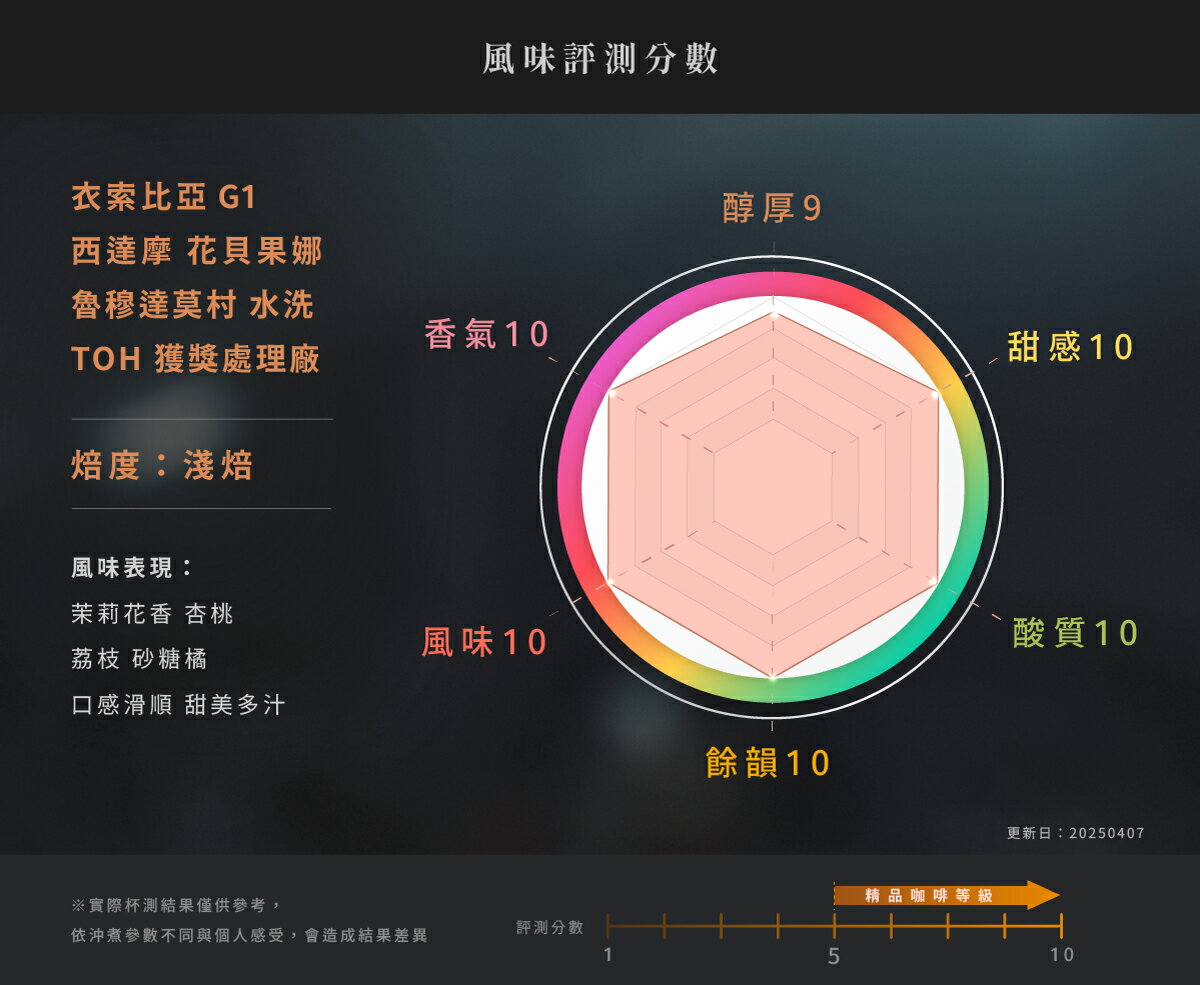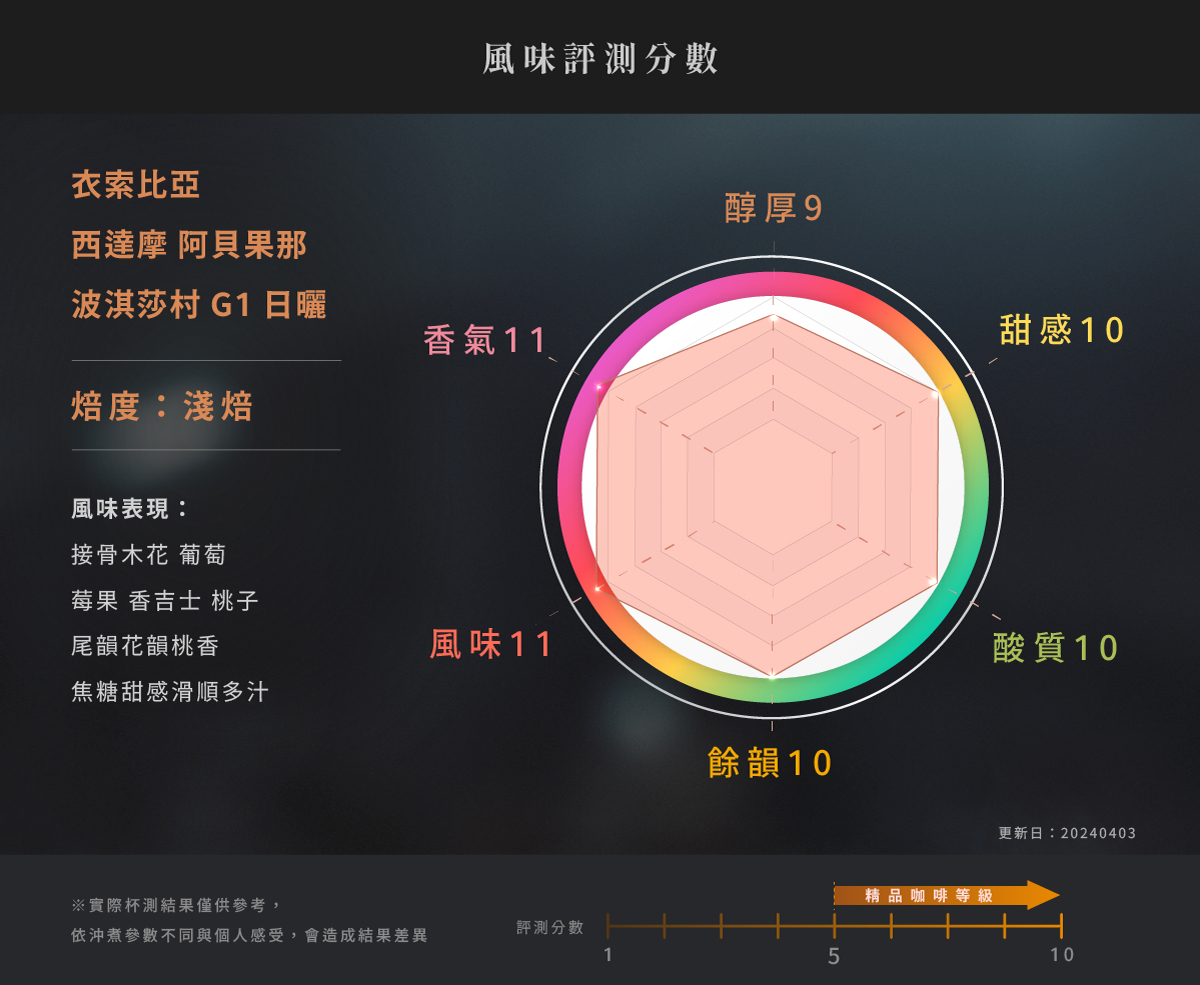

Ethiopia Sidama Arbegona Freshly Roasted, Options:
Ethiopia Sidamo Arbegona OLOROSO Station G1 Anaerobic Natural
Ethiopia Sidamo Arbegona OLOROSO Station G1 Natural
Ethiopia Sidamo Arbegona OLOROSO Station G1 Washed
--------------
Ethiopia Sidama Arbegona Rumudamo G1 Washed-TOH (Taste of Harvest)
--------
Rumudamo
Located in Sidamo, Rumudamo achieved excellent results at the first Ethiopian Cup of Excellence (COE), taking 2nd, 3ird, and 8th place.

◆ Ethiopia Sidama Arbegona Rumudamo G1 Natural Slow Dry - 2024 TOH Natural #2 Lot
※ This lot was awarded 2nd place in the Natural category at the 2024 Ethiopia TOH competition.

Ethiopia Sidama Arbegona G1 Washed
◆ Ethiopia Sidama Arbegona G1 Natural
◆ Ethiopia Sidama Arbegona Bochesa G1 Natural








Coffee Flavor
The flavors of coffee are derived from the breakdown of various nutrients in the green coffee beans during roasting. Heat causes these compounds to degrade into a variety of aromatic molecular structures, resulting in a wide spectrum of flavors. High-quality coffee beans naturally possess a rich aroma that evolves at different temperatures—high, medium, and low—offering a delightful and nuanced experience worth savoring.
Ethiopia Sidamo Arbegona OLOROSO Station G1 Anaerobic Natural
Passion fruit, aromatic marigold, fruity liqueur aroma, grape, and sweet pear.
---
Ethiopia Sidamo Arbegona OLOROSO Station G1 Natural
Rose, violet, passion fruit, grape, apple, apricot, with a sweet fruity note.
---
Ethiopia Sidamo Arbegona OLOROSO Station G1 Washed
Wild ginger flower, apricot, lychee, lily, tropical juice, passion fruit
---
Ethiopia Sidama Arbegona Rumudamo G1 Washed
Jasmine, Apricot, Lychee, Tangerine, Silky smooth, Deliciously Juicy and Sweet
---
Ethiopia Sidama Arbegona Rumudamo G1 Natural Slow Dry
Sugar tangerine, strawberry jam, apricot, lemon and vanilla, brown sugar sweetness
---
Ethiopia Sidama Arbegona G1 Washed
Lemon custard, bergamot, black tea, lemon zest, honey citron tea, white peach, floral, honey finish
---
Ethiopia Sidama Arbegona G1 Natural
Strawberry, Peach, Orange Peel, Blueberry, Mango, Full and Juicy Body
---
Ethiopia Sidama Arbegona Bochesa G1 Natural
Elderflower, Grapes, Berries, Mandarin Orange, Peach, Floral and Peachy Finish, Smooth Caramel Sweetness

西達摩Sidama is a representative coffee-growing region in southwestern Ethiopia, known for its volcanic soil that fosters ideal coffee cultivation. The area is home to 46 cooperatives and over 80,000 smallholder farming families. Sidama is renowned for its exceptional green bean processing capabilities, producing coffees with candied strawberry or blueberry fruit notes, rich yet mellow acidity, and a full-bodied texture. Each year, Sidama produces approximately 10,000 tons of high-quality organic Arabica coffee beans and has been certified by the Fair Trade Labeling Organization (FLO) since 2003.
花貝果娜鎮(Arbegona Woreda)
This is an incredibly passionate washing station. It's hard to imagine that such a rustic place is a consistent champion region in the Cup of Excellence (COE), producing some of the world's most exceptional coffee. Arbegona is located in the high-altitude terrain within the Sidamo zone, bordering Bensa Woreda to the east, Bona Zuria Woreda to the south, Gorche Woreda and Bursa Woreda to the northwest and southwest respectively, and Oromia region to the north. The average altitude of Arbegona town is 2200 meters, making it one of the highest coffee-growing areas in all of Ethiopia. The rich natural resources of the area have nurtured outstanding coffee flavors, with the high altitude accompanied by a uniquely favorable microclimate.
-----
▶ 甜雪莉處理站(OLOROSO Station)
Our close collaboration with local farmers, built on years of mutual understanding, consistently allows us to source the highest quality and most affordable green coffee beans from them. This is especially true regarding our insistence on the 74158 variety. Through numerous cross-tests, we've found that only this cultivar can develop the most captivating flavors in this dreamlike terroir. The fantastic combination of champion plots and a champion variety, with its intense floral notes and fresh fruit-like sweetness, never fails to elicit admiration during our cupping sessions. This year, they told us that their washing station is called "OLOROSO," which means "Sweet Sherry" in Chinese. They hope that you'll not only remember the enchanting Arbegona region but also their washing station's lovely name!
-----
▶ 魯穆達莫處理廠(Rumudamo Station)
Located in Rumudamo Village within Arbegona Woreda in Sidama, this station was formerly owned by Rumudamo Trading PLC. It gained recognition in 2020 at Ethiopia's inaugural Cup of Excellence (COE), earning 2nd, 3rd, and 8th places for its washed coffees. In the 2021 COE competition, it ranked 9th with its natural processed coffee.
Arbegona Woreda is located within the Sidama region and Sidama Zone, bordered by Bensa Woreda to the east, Bona Zuria Woreda to the south, Gorche Woreda to the northwest, Bursa Woreda to the southwest, and Oromia to the north. With an average altitude of 2200 meters, it is one of the highest coffee-growing regions in Ethiopia.
The station sources coffee cherries from 600 local smallholders as well as its own 840-hectare farm cultivating the 74112 variety. The farm produces approximately 350,000 kilograms of coffee annually, equivalent to about 18 twenty-foot containers. Coffee is the main economic crop in the area, alongside sugarcane, enset (false banana), spices, and vegetables.
Situated at an impressive altitude of 2239 meters, the station's terrain slopes down to the Ganale Doria River, providing a convenient water source for its washing processes. Coffee cherries collected here all originate from elevations above 2200 meters. The high altitude results in smaller beans with concentrated flavors.
During a sourcing visit, a batch of experimental natural processed cherries caught the attention of coffee traders. These darker cherries, only two days into drying, demonstrated exceptional sweetness upon cupping, leading to the purchase of this unique natural processed lot.
▶ 波淇莎村 (Bochesa)
Located within the Sidamo zone and Sidama Regional State, it borders Bensa Woreda to the east, Bona Zuria Woreda to the south, Gorche Woreda and Bursa Woreda to the northwest and southwest respectively, and Oromia region to the north. The average altitude of Arbegona town is 2200 meters, making it one of the highest coffee-growing areas in all of Ethiopia. The origin of this particular coffee is the village of Bochesa, situated in the highlands of Arbegona. The uniquely advantageous geographical conditions have resulted in the captivating flavors of these beans.
---------
Grade 1 - G1is the highest quality classification in Ethiopia's coffee grading system.

The coffee tree, botanically classified under the Rubiaceae family and the Coffea subgenus, is an evergreen tree. Coffee beans are the seeds of the coffee fruit. There are three main varieties: Arabica, Robusta, and Liberica. These three varieties cannot crossbreed to produce different subspecies. The world’s specialty coffee comes from the Arabica variety, and within Arabica, there are various subspecies resulting from evolution, hybridization, and mutation.
Arabica coffee originates from Ethiopia, Africa, where hundreds or even thousands of wild coffee varieties still thrive today. Many of these grow undisturbed in the country's ancient forests, forming an immense gene pool of locally evolved hybrids, mutations, and crossbreeds. This diverse local mix is referred to as the genetic pool of Arabica, and the indigenous varieties produced in Ethiopia are known as Heirloom coffees.
In the 20th century, Ethiopia launched a series of official programs to search for, test, and name coffee varieties. To address the impact of a virus affecting coffee trees, the Jimma Agricultural Research Center (JARC) collected 639 coffee varieties, eventually releasing 13 cultivars, including 74110, 74112, and 74158. These varieties demonstrated exceptional performance in the 2021 Cup of Excellence (COE), with 74110 appearing in 8 of the top 30 entries, 74112 in 10, and 74158 in 6.
74158 originates from the Metu-Bishari forest in the Illuababora zone of western Ethiopia, developed by the Jimma Agricultural Research Center. It is highly regarded for its excellent productivity and disease resistance. In terms of quality and flavor, it is undoubtedly outstanding. This variety features prominent citrus and floral notes, complemented by flavors of apricot, strawberry, and blueberry, with an exquisite floral and milk chocolate finish.

(Coffee Processes)
The term "processing methods" refers to the process of transforming ripe red coffee cherries into dried green beans. Each method has its advantages and disadvantages, influenced by the natural environment and the specific needs of the coffee-producing region. As a result, different regions adopt the processing method most suited to their conditions. This batch uses the following three processing methods, described below:
【Anaerobic Processing Method】
In this method, coffee cherries are placed in a sealed container filled with carbon dioxide, creating an oxygen-free environment. The low-temperature conditions slow down the breakdown of mucilage sugars and cause the pH level to decrease at a slower rate, extending the fermentation time. This process enhances sweetness and achieves a more balanced flavor profile.
The slow and prolonged fermentation helps develop a smooth, rounded taste while preventing undesirable dryness or excessive acetic acid. The sealed environment also retains aromatic compounds, preventing them from evaporating. After the anaerobic process, the coffee is further processed using the passion honey method.
【Natural / Sundried / Dry Processed】
Also known as the natural drying method or unwashed process, this is the most traditional and widely used coffee processing method, involving no water during the process. Originating in Ethiopia, the coffee cherries are sun-dried with their seeds still inside. During the extended exposure to sunlight, the beans absorb flavors from the cherry skin, pulp, and mucilage, resulting in coffee with enhanced sweetness, body, and a distinctive aroma.
Producers spread the harvested cherries on sun-drying beds, which may be composed of terraces or elevated platforms. Over a 3–6 week period, the coffee undergoes natural fermentation. During this time, producers turn the cherries regularly to ensure even drying and prevent spoilage. The sugars and mucilage on the seeds develop complex flavors, increasing sweetness.
Once dried, the parchment coffee is mechanically processed to separate the dry pulp and skin from the seeds. Coffee processed using the natural method is juicy and syrupy, offering a rich and rewarding taste that justifies the effort invested in its production.
【Washed / Wet Processed】
Also known as the wet process, this method involves removing the skin and pulp from the coffee cherries before drying. The beans are fermented in tanks to eliminate any residual mucilage from the seeds. After fermentation, the beans are thoroughly washed and then dried either in the sun or using mechanical dryers.
The washed process results in a cleaner and crisper cup profile compared to natural processing. It produces coffee with lighter body, brighter acidity, and a more refined fruitiness. Washed coffees typically highlight vibrant and distinct flavor notes, embodying the complexity expected in specialty-grade coffee.
高冷地濃縮乾燥日曬【Slow-Dry Natural】
After harvesting, fresh cherries are delivered to the processing station, where they undergo density and quality sorting. This involves immersing the cherries in large water tanks for separation. Only cherries that sink to the bottom are processed as G1. Once sorted, the cherries are transferred to African drying beds covered with shade nets.
The process begins with manual selection, where only red cherries are included in the batch. Workers at the station turn the cherries every 30 minutes to ensure even drying and to prevent over-fermentation or mold. Due to the high altitude and cooler temperatures, the drying process takes an average of 22 days. After drying, the parchment coffee is stored in warehouses to develop its flavors further.
The term "high-altitude" is often used in agriculture to describe crops grown at elevated heights. In such environments, shade nets are employed to ensure cherries dry under low temperatures and slow drying conditions. This coffee boasts a uniquely rich and intense flavor profile, with every sip delivering the concentrated and robust notes derived from its slow drying at high altitudes.





JUSTIN INTERNATIONAL FOOD ENTERPRISE CO., LTD.
Tel: +886-3-358-6611
1st Floor, No. 30, Lane 120, Daxing Road, Taoyuan District, Taoyuan City
▶This product is covered by a NT$10 million product liability insurance.
▶Food Industry Registration Number: F-165601955-00000-0
▶ Our company’s cupper is certified as a CQI International Coffee Quality Appraiser.



Recommended Products



※ For detailed shipping and payment information, invoices, overseas ordering instructions, etc., please click here to enter.
